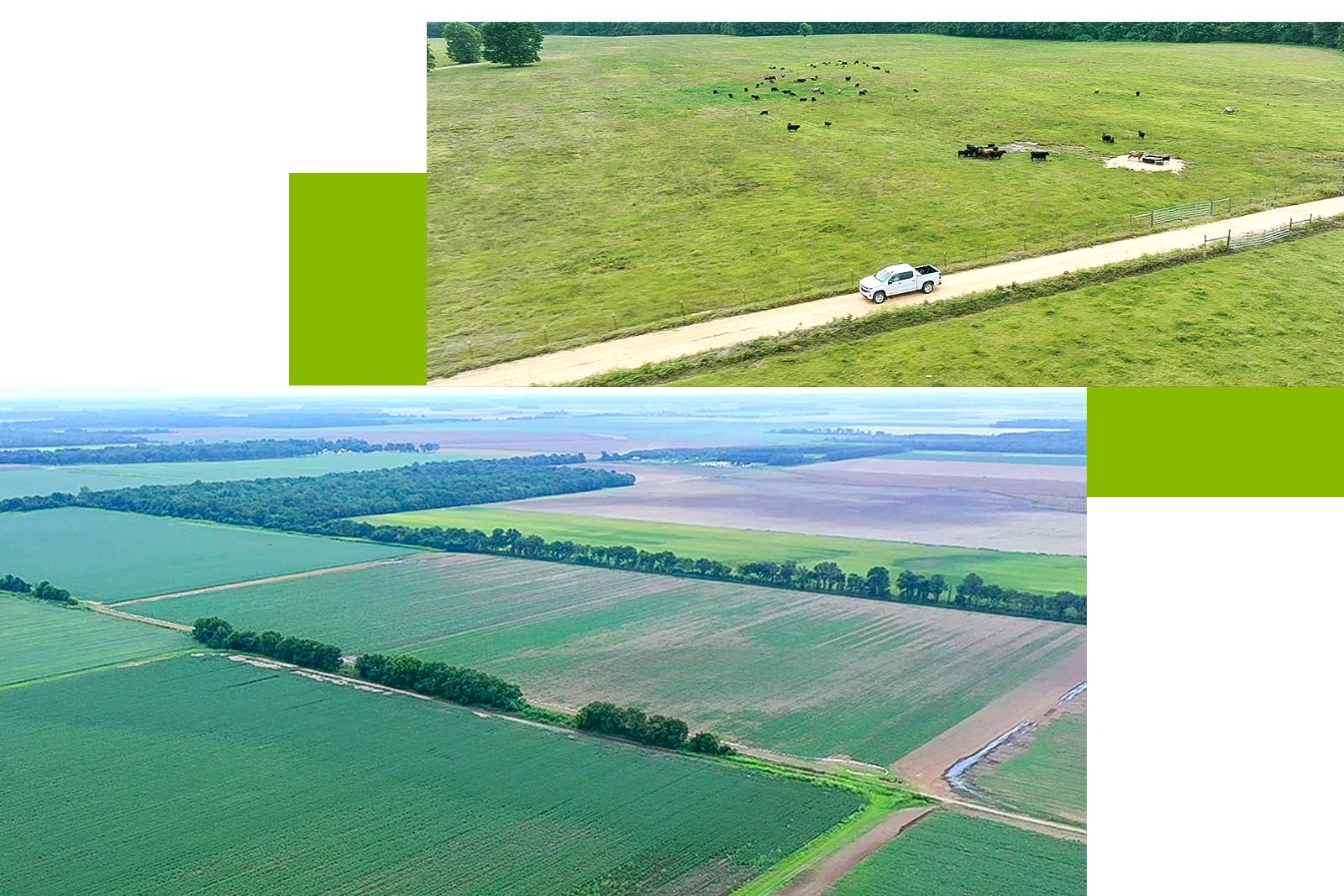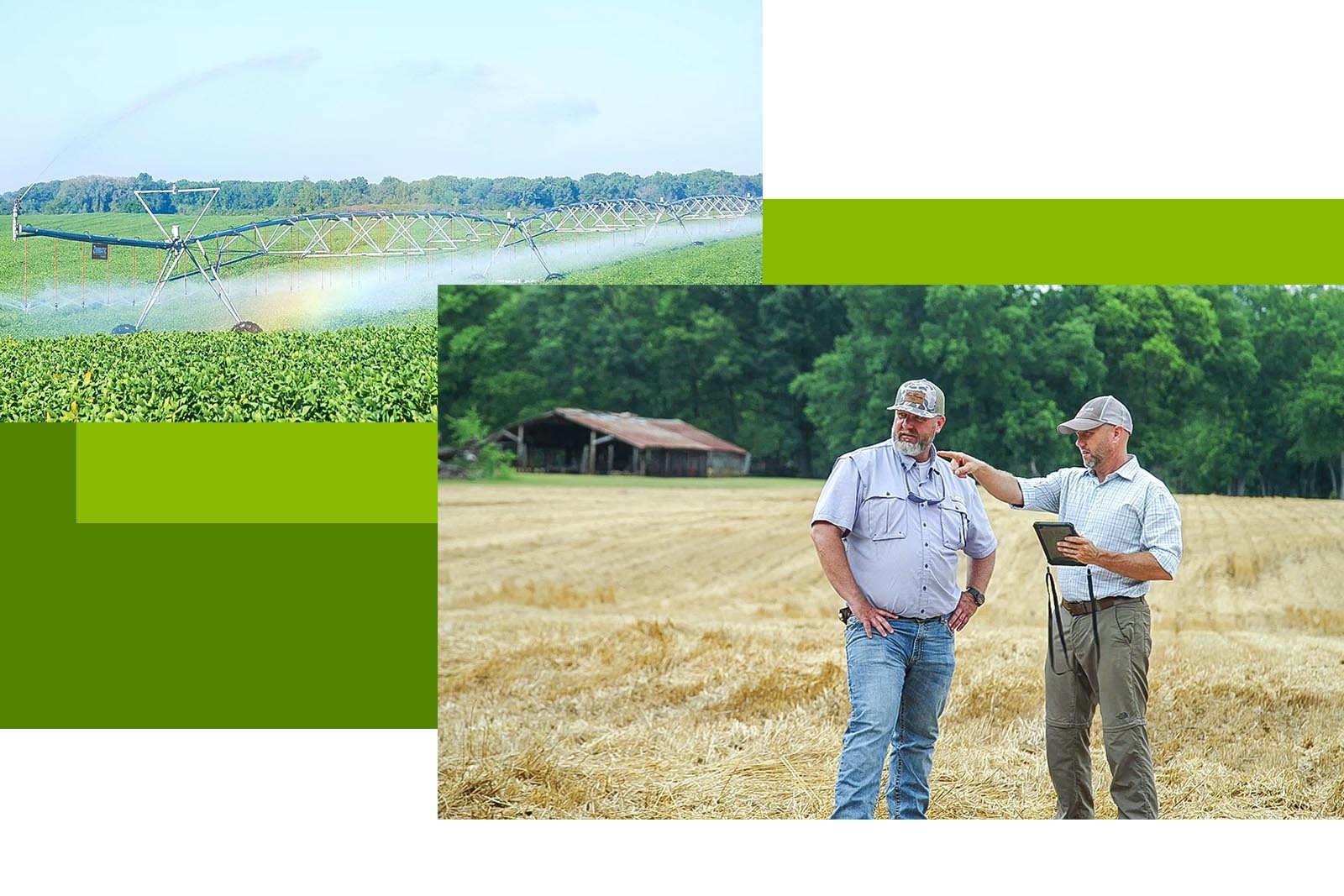At a time when stock prices are slumping and inflation is soaring, farmland looks to be an appealing investment, according to a 2022 article from Barron’s. The story notes that farmland is a real asset that performs well in inflationary environments, delivers stable returns over long holding periods, and exhibits low correlation to financial assets.
So, whether you currently own farmland or are considering investing in this type of natural resource asset, there are a lot of considerations when it comes to management.
This is where Regions’ Brooks Wall and his team come in. A niche group in the financial industry, Walls’ farmland asset team consists of farm managers, account officers, wealth advisors and tax professionals dedicated to helping clients navigate the holistic financial wellbeing of these land assets.
“The Natural Resources and Real Estate group was established to manage natural resources and real estate assets held in trust at the bank,” explained Wall. “Most bank trust departments hire outside management companies to manage their clients’ assets. In 1956, Regions’ predecessor First National Bank of Birmingham, brought that function in-house, hiring a team of professionals that really understand the complexities of managing these assets.”
With approximately 125,000 acres of farmland under management, Wall and his team are more likely to be found out in the field, quite literally, than in a typical banker’s office.
In addition to managing these natural resource assets as trustee and fiduciaries for a client’s trust, the team can also facilitate agency agreements with landowners.
“With an agency agreement, we don’t hold the title as we do with trusts, but in these cases, the landowners are still needing someone to manage the land,” said Wall. “In many cases it’s an aging landowner who just needs a little help or maybe the next generation that doesn’t want to sell the farm but doesn’t have the time or desire to manage it.”

One of our responsibilities as farm managers is making sure clients are aware of and signed up for the appropriate programs. We are also there to help negotiate lease agreements with a reputable farmer to ensure soil health and productivity is maintained.Brooks Wall, Regions Natural Resources asset manager
This is the benefit of an agency agreement, created to help manage these properties for the client while maintaining an income stream and reaching growth potential for the landowner who may have inherited the land or purchased the land as an investment.
There are government subsidies available for landowners, but in order to receive those subsidies, you must sign up for the programs,” said Wall. “One of our responsibilities as farm managers is making sure clients are aware of and signed up for the appropriate programs. We are also there to help negotiate lease agreements with a reputable farmer to ensure soil health and productivity is maintained.”
Regions’ clients are also able to take advantage of our affordable liability insurance coverage for their property. Our farm managers work with local crop insurance agents to ensure that our client’s crop income is covered at optimum rates specific for each client.
While Regions Natural Resources and Real Estate group serves clients throughout the bank’s 15-state footprint, the majority of farmland under management is in northwest Alabama, the Tennessee River Valley, Mississippi Delta, Arkansas, Illinois, and Georgia growing key agriculture crops including corn, cotton, soybeans, wheat, and rice. Wall oversees a team of five farm managers, including Jake Pustejovsky, a ranchland manager based in Houston, who also focuses on real estate assets throughout Texas.
“Investing in ranchland is a growth opportunity for many looking for alternative assets,” said Pustejovsky. “We often serve as trust advisors for our clients who invest in ranchland to either hold as raw land for pure appreciation value and future sale or lease to a rancher as grazing lands or livestock fields.”
A growing business, ranchland management and pastureland management are another focus of Regions farmland management team within Natural Resources and Real Estate. Pustejovsky knows firsthand the unique needs and challenges of ranchland owners.
We often serve as trust advisors for our clients who invest in ranchland to either hold as raw land for pure appreciation value and future sale or lease to a rancher as grazing lands or livestock fields.Jake Pustejovsky, Regions ranchland manager
“On the agency side, ranches are very project- and goal-specific,” said Pustejovsky. “We can buy land, sell land, move trees around for different needs. It hits a lot of categories including recreational, livestock, or raw land held for eventual sale for new commercial or residential development.”
He noted that while traditional row crop farmland is very consistent, ranching can cover a lot of different aspects – and his focus is working with the ranchland owner to achieve their financial goals.
Regions’ farmland team recently helped a Mississippi client who was looking to raise cash. With help from the specialized banking team, a portion of the land was sold, and proceeds were used to add irrigation wells and complete some needed land leveling on the remaining tract. The rent on the upgraded property is equal to the rent previously received on the larger non-irrigated land.
“Our client was able to raise the money needed, improve the remaining land, increasing its value, and maintaining the income,” said Wall. “This is just one example of how our team of farmland managers work with clients and banking professionals to help out clients achieve their financial goals.”
doingmoretoday.com/creating-wealth-and-sustainability-through-timberland-investments
For more on Regions Natural Resources and Real Estate:
This information is general in nature and is not intended to be legal, tax, or financial advice. Consult an appropriate professional concerning your specific situation and irs.gov for current tax rules. The purchase of an insurance product through Regions Bank or any of its affiliates is completely optional. Regions Bank may not condition an extension of credit or the provision of other services on either: 1) the purchase of an insurance product through Regions Bank or any of its affiliates, or 2) an agreement not to obtain or a prohibition on obtaining, an insurance product from an entity not affiliated with Regions Bank.
Regions provides links to other websites merely and strictly for your convenience. Linked websites are operated or controlled by a third party that is unaffiliated with Regions. The privacy policies and security at the linked website may differ from Regions privacy and security policies and procedures. You should consult privacy disclosures at the linked website for further information.
Trust and investment management services are offered through Regions Private Wealth Management, a business unit of Regions Bank. Investment advisory services are offered through Regions Investment Management, Inc. “RIM”. RIM is a Registered Investment Adviser and wholly owned subsidiary of Regions Bank, which in turn, is a wholly owned subsidiary of Regions Financial Corporation.